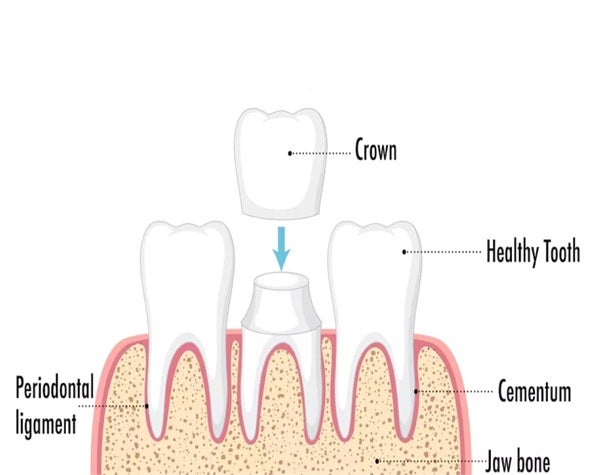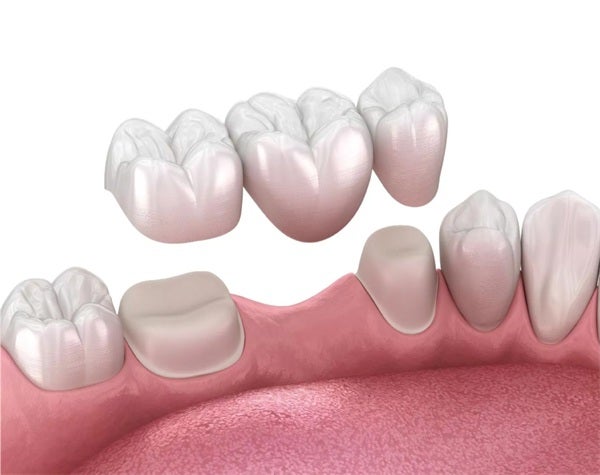Modern dentistry offers a wide range of restorative treatments that not only repair damaged teeth but also improve your smile and overall oral health. Among the most trusted solutions are dental crowns and bridges — time-tested procedures that help restore function, appearance, and confidence.
If you're searching for the best dental clinic near me, understanding your treatment options is crucial to making informed decisions about your oral health. In this article, we’ll explore everything you need to know about crowns and bridges — their uses, benefits, procedures, aftercare, myths, and more.
What Are Dental Crowns?

A dental crown is a custom-made “cap” placed over a damaged, decayed, or weakened tooth to restore its shape, size, strength, and appearance. It fully encases the visible portion of the tooth above the gum line.
Common Reasons You May Need a Crown:
- Severely decayed tooth that cannot hold a filling
- Cracked or broken teeth
- Worn down teeth due to grinding (bruxism)
- After a root canal treatment
-
To support a dental bridge
- To cover a discolored or misshaped tooth
-
To restore a dental implant
What Are Dental Bridges?

A dental bridge is a fixed dental prosthetic used to replace one or more missing teeth. It literally “bridges” the gap left by missing teeth, using the adjacent natural teeth or dental implants as anchors.
Components of a Dental Bridge:
- Pontic: The artificial tooth/teeth replacing the missing ones.
- Abutments: The supporting natural teeth or crowns on either side.
Types of Crowns and Bridges
You’ll find a range of materials to suit different needs:
Porcelain-fused-to-metal (PFM)
Durable and aesthetically pleasing; commonly used for back teeth.
All-Ceramic or All-Porcelain
Excellent for front teeth due to their natural look.
Zirconia Crowns
Extremely strong and biocompatible; ideal for patients with metal allergies.
Metal Crowns (Gold or Base Metal Alloys)
Very durable and wear-resistant; less aesthetic but ideal for molars.
Composite Resin
Less costly, but also less durable; used for temporary solutions.
The Procedure: What to Expect
For Dental Crowns
- Initial Consultation & X-rays
- Tooth Preparation: The damaged tooth is reshaped.
- Impressions: Sent to a lab for crown fabrication.
- Temporary Crown: Placed while the permanent one is being made.
- Final Fitting: The permanent crown is cemented securely.
For Dental Bridges
- Diagnosis and Planning
- Preparation of Abutment Teeth: These teeth are reshaped for crown placement.
- Impression Taking
- Temporary Bridge Placement
- Permanent Bridge Fixation
Each procedure is typically completed in two visits, but modern digital dentistry may reduce the number of appointments needed.
Benefits of Crowns and Bridges
- Restore chewing and speaking ability
- Improve appearance and self-confidence
- Prevent shifting of remaining teeth
- Protect weak teeth from further damage
- Long-lasting when properly cared for
Aftercare: How to Maintain Your Crown or Bridge
Proper care ensures longevity — many crowns and bridges last 10–15 years or more.
Daily Oral Hygiene
Brush twice a day, floss carefully (especially under the bridge), and use antibacterial mouthwash.
Regular Dental Checkups
Routine visits to a qualified dentist — help detect early issues and prolong the life of restorations.
Avoid Hard Foods
Don’t bite hard objects like ice, pens, or nuts with your crown or bridge.
Use a Night Guard (if needed)
Especially if you grind your teeth during sleep.
Common Myths About Crowns and Bridges – Busted!
“Crowns last forever.”
While durable, they aren’t permanent and may need replacement over time.
“Bridges damage healthy teeth.”
When done correctly at a reputable clinic, bridges preserve function without harming adjacent teeth.
“Crowns/bridges don’t need cleaning.”
They’re still attached to real teeth or implants and require the same care as natural teeth.
“Bridges aren’t as good as implants.”
Each has its place — bridges can be an excellent, cost-effective alternative when implants aren’t an option.
Choosing the Right Dentist for Crowns and Bridges
Dental crowns and bridges are precision procedures. They require expert evaluation, high-quality materials, and a skilled hand for proper fit and aesthetics. Whether you’re restoring a single tooth or replacing multiple missing ones, your results depend on who performs the treatment.
If you're looking for a best dental clinic near me in Lahore, consider factors like:
- Dentist’s experience and specialization
- Use of modern dental technology
- Patient reviews and satisfaction
- Infection control standards
With 20+ years of expertise and a patient-centered approach, Dr. Aamir Rafiq and his team at Dental Surgeons - a leading dental clinic in Lahore provide reliable, safe, and aesthetically pleasing restorations.
Final Words
Crowns and bridges are more than cosmetic fixes — they’re critical tools in preserving oral health and restoring quality of life. With proper care and expert guidance, they can give you a strong, healthy, and confident smile for years to come.
If you’re in Lahore and considering your options, consult with an experienced dental professional. Knowing what to expect and choosing the right clinic can make all the difference in your treatment experience and outcome.